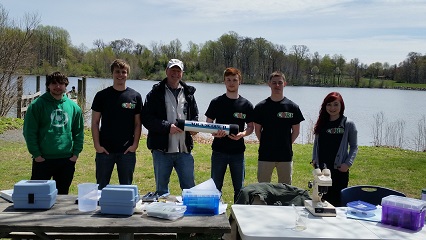
Bucks’ newest club, The Council of Realistic Ecologists (CORE), took part in Middletown Township’s Earth Day festival, educating attendees about the health of their local waterways, and the tests aquatic ecologists use to monitor them.
The club’s objective is to gather data on their local environment, and use it to help their community improve the environment.
So, as apart of Middletown Township’s Earth Day held at Core Creek Park, CORE set up a booth down by Lake Luxembourg, and invited people to take part in testing the lake water.
The club ran a variety of freshwater aquatic tests, examining the Lake’s nitrate and phosphate levels, the amount of dissolved oxygen, PH levels, as well as gathered organisms from the lake like plankton.
By gathering organisms, like tardigrades commonly referred to as water bears and cladocera (water fleas), aquatic ecologists can see if a stream or river is lacking in nutrients.
Water bears and fleas feed on algae, phytoplankton, and natural waste. These organisms make up the bottom of the food chain in freshwater waterways.
Another indicator for the health of a waterway is the organism didymosphenia geminata, also known as rock snot. A large build of rock snot indicates the water temperature is too low and lacks nutrients to sustain other aquatic life.
Rock snot is a species of diatom that lacks a natural predator and produces nuisance growths on the beds of freshwater rivers and streams, and on the underbelly of rocks, hence the name “rock snot.”
The club ran their results against the EPA’s standard ranges, and found the water of Lake Luxembourg was up to par.
However, if the test results are not within the EPA’s standard ranges, it indicates the water is unhealthy.
Kyle Foisy, 19, biology major, CORE club president, explained that, “Too much or too little of one thing can lead to an unhealthy environment for the wildlife, and us” said.
Fosiy began to take a hard look at the changes affecting the environment around him after taking an ecology course last semester.
“I noticed a lot of things in the environment are changing and no one’s doing anything,” said Fosiy.
So Fosiy and the CORE’s Vice President Kyle Kaye began to round up people they knew who wanted to help preserve the environment.
“It started with their passion and they pulled us all in,” said club treasurer Stephanie Fusco, 20, biotechnology major.
The CORE club was just approved by Bucks in late March, but has already begun to work feverishly to improve their local environment. Already they’ve helped remove a dam in Newtown that was preventing a small stream from getting a healthy amount of nutrients.
It is not just local water ways that CORE is concerned about, “We want to go around and plant flowers and bushes to aid the honey bee population,” said Fusco.
The club aims to go to elementary schools and educate children on the importance of environmental conservation.
“We’re trying to pull kids back into science,” said Fusco.
The CORE club meets every Wednesday in the lobby of Founders Hall at 4 p.m.
“We’re very, very new, but we’re ambitious,” said Fusco.
For those who are passionate about cleaning up the environment but do not know where to start, Kaye advised just taking the time to walk through a local park and pick up the trash.
“Local communities getting involved is the best way to help because we live here,” said Kaye.
While club secretary, Joseph Kozari, 20, history major provided a single step process to bettering the environment, “Step one: join our club.”

